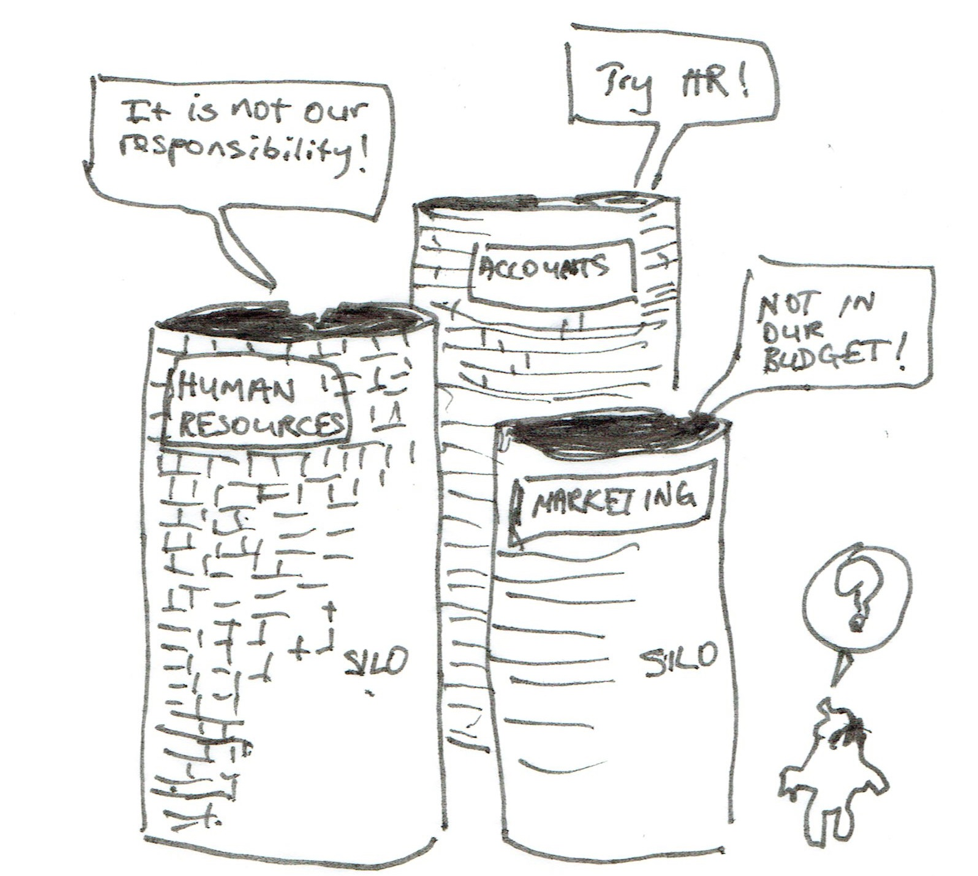
 |
| I have written this because I care about your success in business. If you care about the success of someone else in business click "Send this page to a friend". Ask them to let me know that you were involved. |
Contact
Bruce Holland
| mob+6421 620 456 |
| Bruce.Holland@virtual.co.nz |
 |
The curse of silos, slowness and small-thinking in large mature organisations
Silos are the most universal problem facing large mature organisations
I think silos may be the most universal problem facing large mature organisations. And most people don't realise how much pain it is causing or the cost to the organisation. Silos cause slowness and small-thinking because people are focussed inward protecting budgets and power structures rather than focussing outward on customers and problem-solving.
What are silos?

Silos are nothing more than the barriers that surface between departments within an organisation, causing people who are supposed to be on the same team to work against each other. And whether this phenomenon is called departmental politics, divisional rivalry or turf warfare, it is one of the most frustrating aspects of life in any large mature organisation.
Silos are not a structural issue they are the result of poor thinking. Managers tend to respond to silos by reorganising but this is hardly ever the most important aspect or the place to start. What we need to do is change thinking.
Slowness
According to Alvin Toffler, writing in Power Shift: since the end of World War 2 the world has been split into Capitalist and Communist, North and South, however today these old divisions no longer matter nearly as much as a new division: Fast and Slow. He says that historically power has always moved from the slow to the fast whether it was in species, nations or organisations.
Speed in organisations is determined by:
- The speed of transactions
- The speed of decision making
- The speed with which new ideas are created
- How fast ideas are bought to market
- The velocity of capital flows
- The speed which information and knowledge flows through the economic system.
All of these are cursed in an organisation suffering from silos.
They are cursed because there is no doubt that markets are speeding up. Those organisations that learn how to manage time will do better. The mass market is disappearing, and management that choose to ignore the implications of a faster market are increasingly being reduced to commodity-like competition.
It is happening so fast that people can perceive the change. For example, in the 1800s, things like electricity and photography took almost a century to commercialise. In the early 1900s, aeroplanes, and combustion engines took around a decade to commercialise. Now, we are looking at technologies that are out in a matter of years. Microchips are, now on a nine month cycle and they used to be on a two-year cycle.
Small-thinking
In silos people are focussed on themselves ("How can I get more?") or their teams, or their departments. Almost by definition people in silos are not working for the benefit of the organisation at large. Often people do things that seem beneficial at the lower level but destroy value from the whole. This includes fighting each other and competing with each other for resources and power.
Significant things can not happen when silos exist, people are just too busy maximising the parts. It is like a cancer that grows and grows for its own benefit without any regard to the body it is part of; and eventually it will kill the body.
The cost of silos
Organisations may have a first rate strategy; they may even have the skills to execute and yet still fail if the strategy is torpedoed because of silos and lack of trust.
Today the costs of silos are even more costly because the world has entered a global knowledge worker economy that evolves around partnerships and relationships. This includes the ability to establish, grow, extend and repair interpersonal relationships at all levels of the organisation.
Where silos are strong I find infighting occurs to a high level and attention shifts drastically inward, away from issues such as customers and outcomes, toward battles over budgets, titles and responsibility for mistakes.
At the organisational level they separate work teams, departments and divisions. Silos make managers eager to defend their power, hoard capital and talent even when those resources could be better used elsewhere.
They cause people who are supposed to be on the same team to work against each other, paralysing performance. These factions breed office politics and infighting that cause stress and exasperation that ultimately kills productivity and pushes the best people towards the door.
Battles occur between the headquarters and the field office. And between marketing and engineering. And even within engineering, researchers and developers can be at war over who warrants more head count, budget dollars, and recognition for the success of products.
Instead of focussing on the results of the organisation, managers focus on:
- Their own ego
- Their status
- Their teams
- Their own departments.
As a result all work becomes piecemeal, diffused and unfocussed; in other words the exact opposite of "strategic".
Silos are not a structural issue, they are a matter of attitude
In my experience the way managers respond to silos is to look for structural solutions. The response is: "These people are in towers. They won't talk to each other. Lets reorganise". As you will see later on the organisational structure is one of the ten factors we need to examine but it's hardly ever the most important or the place to start.
Silos are usually not structural issues they are usually mental issues. Silos exist because managers have the wrong mental models. They have mental models of:
- Competition rather than cooperation
- Separation rather than connection
- Scarcity rather than abundance
- Short-term rather than long-term
- Ego and power-over rather than teamwork and power-to.
And where these mental models exist, silos will exist no matter how the organisation is structured.
Although silos may be the most common way of working, I can prove that they are not the natural way of working (this is the subject of another paper). The fact is, most employees deep within an organisation have a genuine interest in working well across divisions. That's because they feel the daily pain of departmental politics as they are left to fight bloody, unwinnable battles with their colleagues.
Why silos occur
In most situations, silos rise up not because of what executives are doing purposefully, but rather because of what they are failing to do. They fail to lead and role model:
The key principles behind the new science of collaboration and productive partnerships
- Establish active relationships between key individuals across boundaries
- Establish joint visions and strategies across boundaries
- Measure success within strategic policy partnerships
- Provide themselves and their employees with a compelling context for working together.
Without this leadership and role modelling, employees at all levels - especially the senior team - easily lose their way. Even the most well-meaning, intelligent people get distracted and confused.
The new science of collaboration
I think the potential for cooperation, trust and tolenance, leading to deep relationships may be the greatest competitive advantage to any organisation.
In New Zealand we have most of the conditions necessary to realise this potential because our commercial society, though far from perfect, starts from a position as one of the best in the world in this regard.
Some organisations have genuine cooperation between departments and within departments. Inevitably they are led by people who intuitively understand what is required. This is because until recently we've had to rely on intuition to understand the Laws of networks and relationships and as a result, although a few people have hit upon these secrets, most have been in the dark. Now these Laws have been codified into a whole new Science. The trouble is these laws have been largely restricted to computer science and sociology.
The Laws include:
- The Science of Networks
- Metcalfe's law
- The Law of Weak Ties
- The Law of Switches
- The Law of Connectors
- The Law of Proximity
- The Law of Reciprocity
- The Law of Self-Organisation.
Over the last year I've tried to simplify them and turn them into management principles - I call it P.A.L.s (Partnerships, Alliances and Linkages). With P.A.L.s you can dramatically improve your ability to Network and build Relationships. I think it's one of the most important advances in management because it gives us the technology to work at the next level in the system.
Our process to improve silos, slowness and slamm-thinking
Over the last 15 years Bruce Holland has developed a 10 part process for busting silos. Breaking silos is not easy. There are always physical, emotional and even spiritual reasons for why they exist in the first place.
Breaking silos is not quick. It involves a process over several months probably starting with the Top managers and progressively touching every person in the organisation, or at least until the "tipping point" has been reached (when about 15% to 20% of people are behaving in the new way.
For more on our process and where to start see DeSilonisation Product
Best wishes
Bruce Holland
Founder Virtual Group Business Consultants.
Wellington New Zealand.


